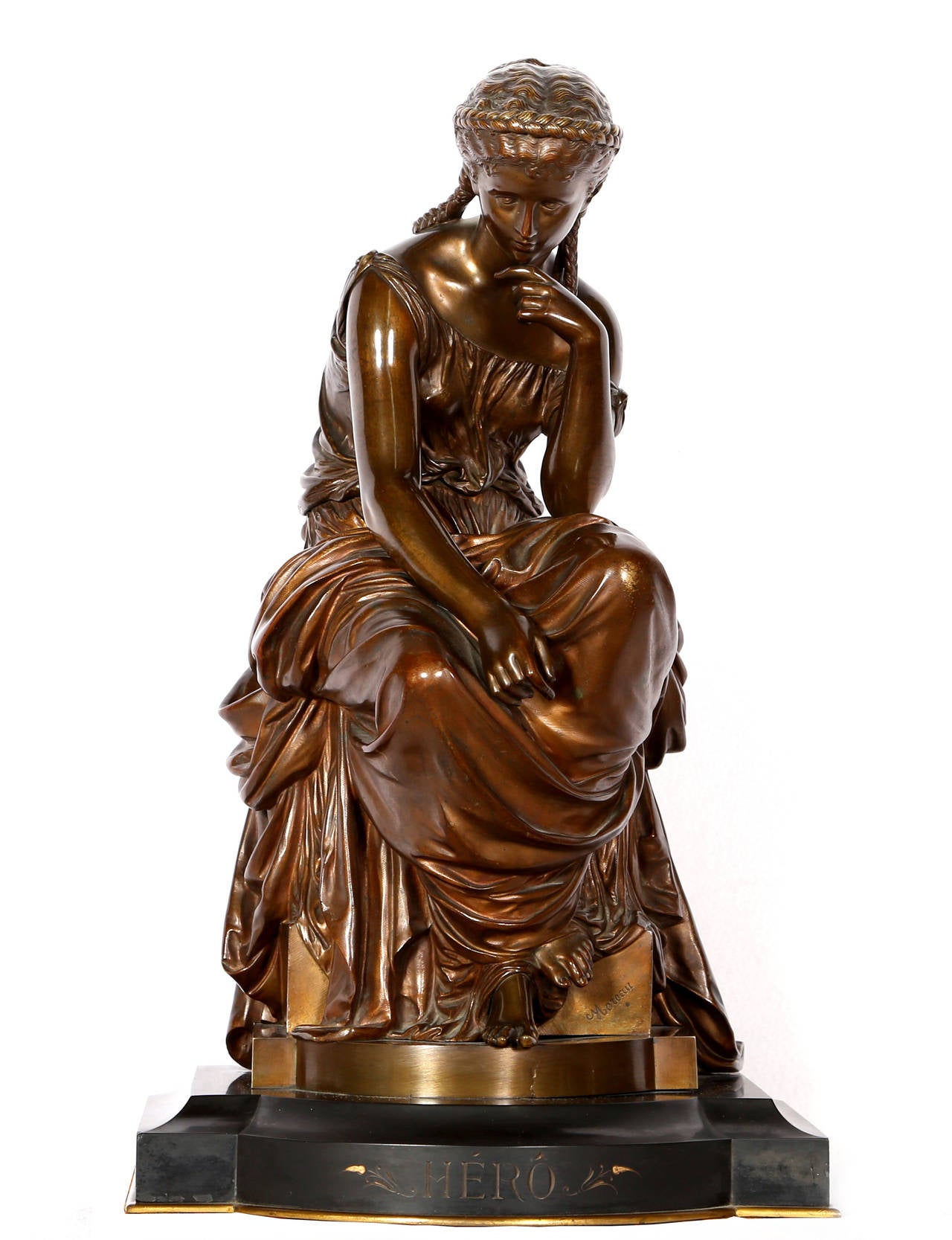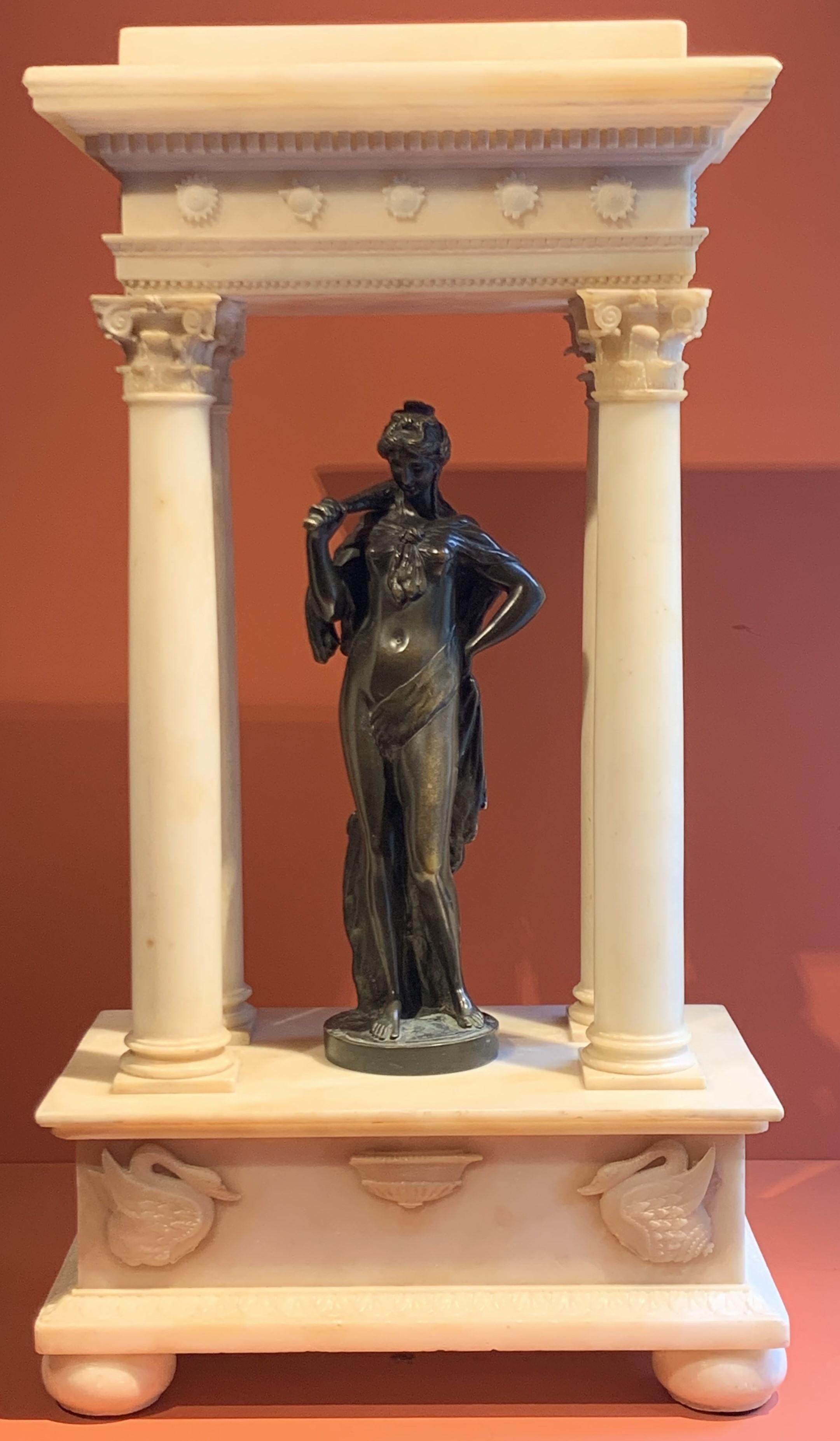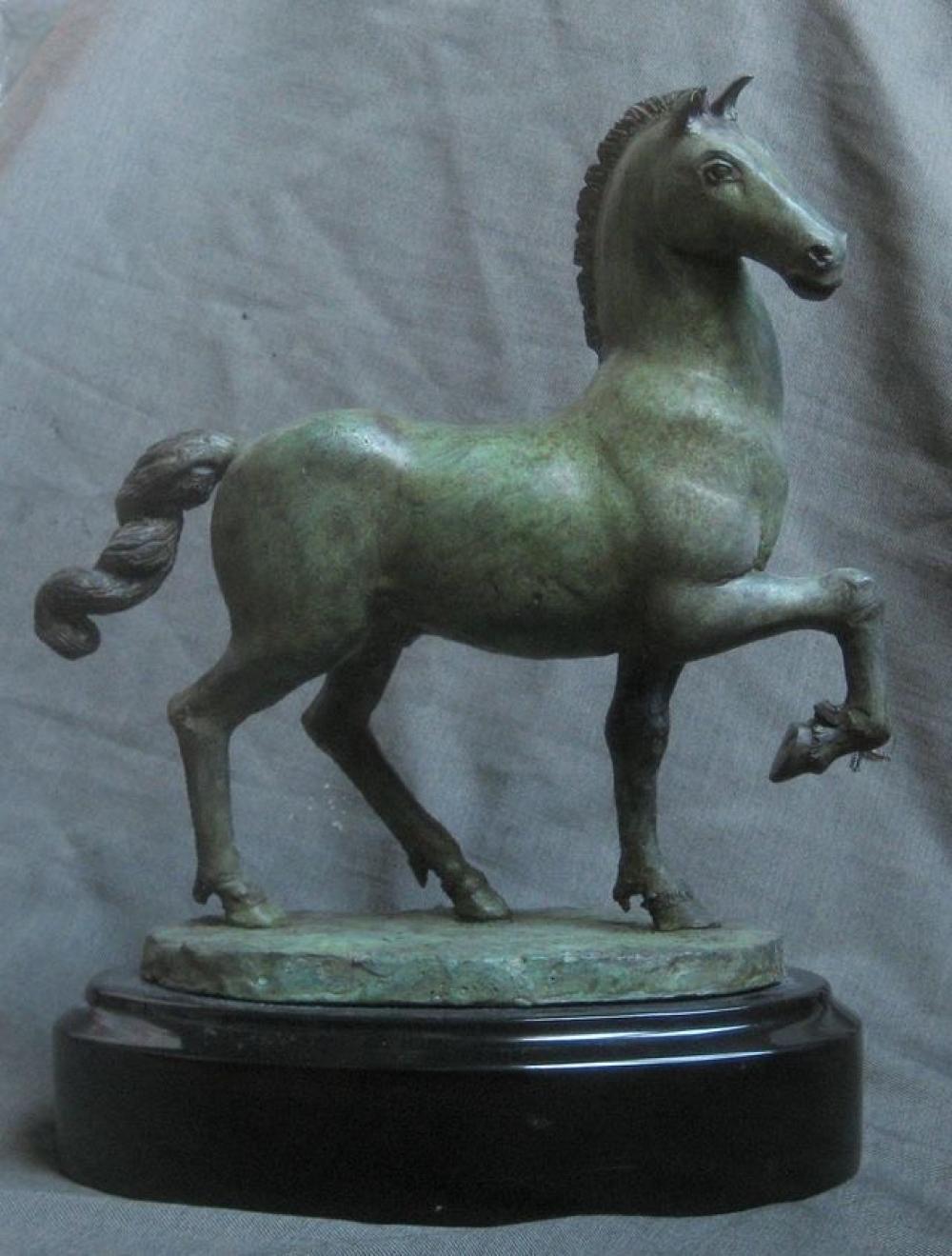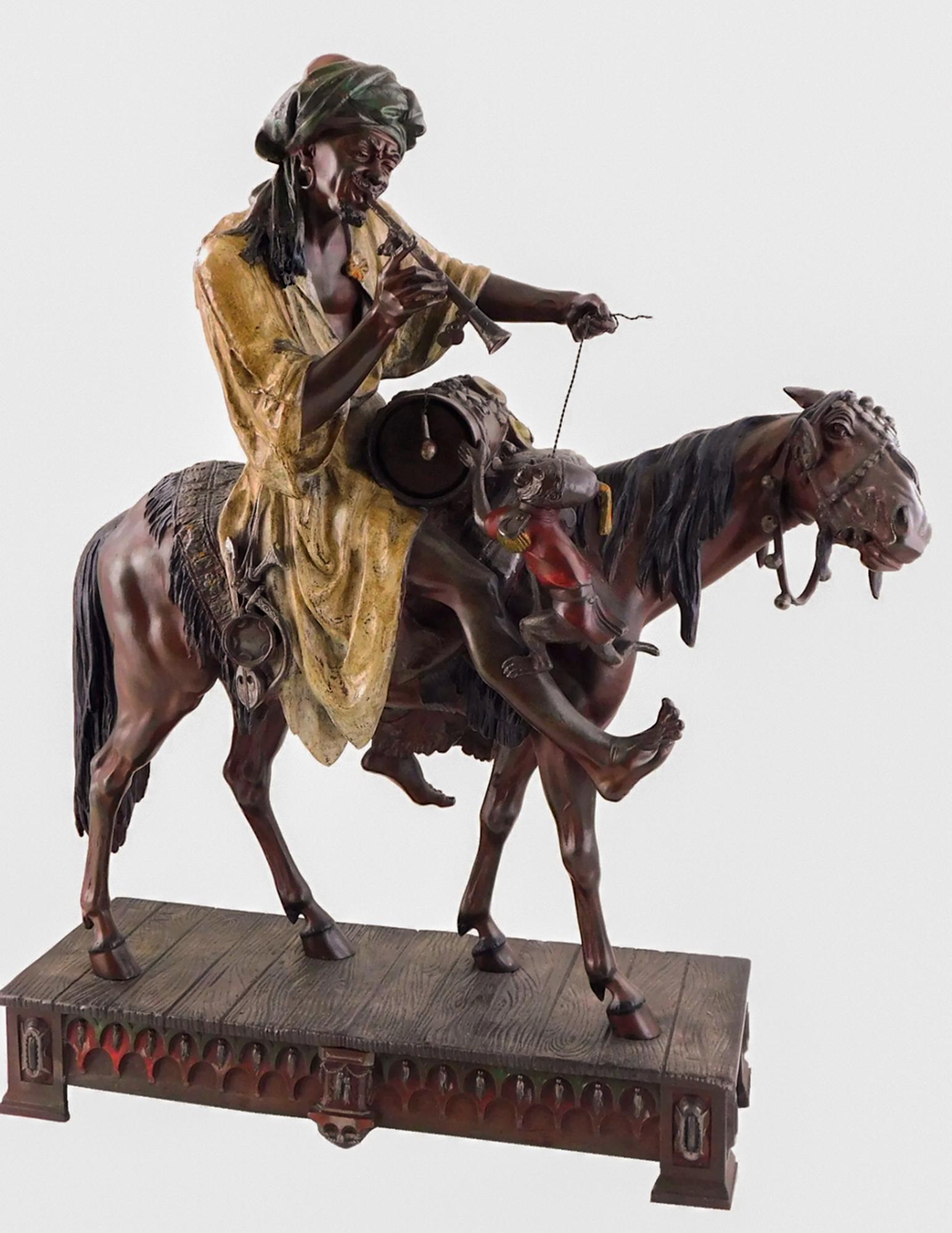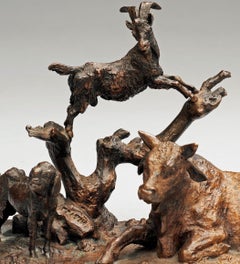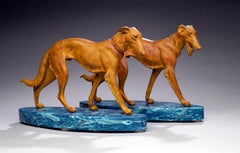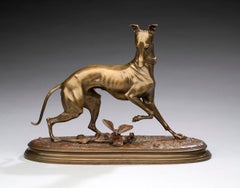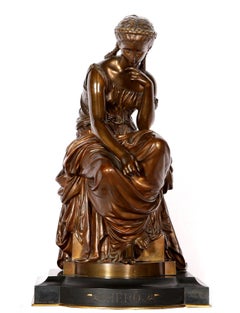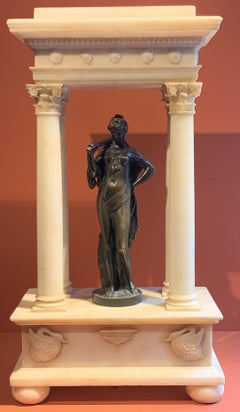Items Similar to Antique Exceptional Bronze Draft Horse by Pierre Jules Mêne (French, 1810-1879)
Want more images or videos?
Request additional images or videos from the seller
1 of 13
Pierre Jules Mêne Antique Exceptional Bronze Draft Horse by Pierre Jules Mêne (French, 1810-1879)Circa 1860s
Circa 1860s
About the Item
Antique Horse Bronze
Exceptional Bronze of a Draft Horse
Pierre Jules Mêne (French, 1810-1879)
Circa 1860s
4 3/4 (W) x 3.25 (H)
As Mêne personally oversaw the fabrication of each one of his pieces and was obsessive about quality, this little bronze is truly superb. The casting is highly refined and clear with minute details with deep, warm patina. This is a ridiculously fine bronze in a small package.
Pierre Jules Mêne (1810-1879), aka P.J. Mêne, was the son of a metalsmith, and received his earliest teaching on sculpture and foundry work from his father. Although mostly self-taught, having never attended any of the prestigious art schools, Mêne was also influenced by the painters Edwin Landseer of England with his expressive sentimentality, as well as Carle Vernet of France, in capturing spirit, grace and compositional beauty in sculptural form. Mêne began his career and earned his living by doing small jobs with metals such as furniture adornments and clock decorations.
Ultimately, P. J. Mêne was one of its earliest pioneers and subsequently became one of the most prolific, and probably the best-known, animalier sculptors. Like so many animalier of the day, Mêne's early studies were made at the Jardin des Plantes in Paris, where he developed his great talent for animal sculpture. Mêne did not sculpt statues, but rather bronze statuettes most frequently of domestic and farm animals at rest, (horses, dogs, cows, bulls, sheep, and goats). His favorite subject was the horse, of which he is considered to be the master at portraying. Next to horses, Mêne modeled many sculptures of dogs, both at work and at play. He created bronze sculptures ranging from animal portraits, to combat groups, to domestic animals, and equestrian groups of both racing and hunting.
Mêne's earliest works reflected Antoine-Louis Barye's influence, but in contrast with the romantic style of Barye, Mêne excelled in realistic portrayals of animals, sculpting each in their natural habitat, capturing fleeting movements and delicate details.
Generally, his sculptures were portraits with a hint of human personality. Mêne was praised for his "perfection in modeling the figures of animals, and for the truth and beauty of his representations." He worked in the Juste Milieu, blending romantic and naturalist elements while retaining a degree of traditionalism.
Beginning in 1838 Mêne began work at his own foundry, casting his own works and later also those of his son-in-law Auguste Cain. He became absorbed in the meticulous work of casting and chiseling and ensured that they were always checked for quality, color, and finish before they were allowed to leave the foundry. Each cast was of the highest quality and finest patinas. The last cast of an addition was edited as sharply as the first, and he was meticulous in the after work of his bronze casts, chiseling the extremely fine details. His bronzes were signed in block letters "P. J. Mêne" with no foundry marks. Declining many offers to do monuments, Mêne instead concentrated on his successful business of producing and marketing his very popular bronze sculptures. His only sculpture acquired by the State of France during his lifetime was the bronze Mounted Huntsman and His Hounds.
Auguste Cain, who continued Mêne's foundries from 1879 to 1892. Subsequently, Mêne's models were sold to the Barbedienne and Susse Freres Foundries which cast well into the 20th century. Though of fine quality, these later casts by Barbedienne and Susse Frères do not have the vitality and attention to detail that Mêne achieved on the casts from his own foundry.
Charming and charismatic, Mêne was accepted socially within the various French artistic communities. He was just as comfortable entertaining the intellectuals of Paris as he was with his apron on among his foundry workers. Through his notable charm, he drew the finest craftsmen to work for him in his foundry and his home became a fashionable meeting place for the painters, sculptors, and musicians of Paris.
It was in 1838 when he first exhibited a bronze statuette at the Paris Salon. From that time on, Mêne exhibited regularly until his death, ultimately receiving four awards from the Salon. Many of Mêne’s subjects were shown to the general public in this popular showcase where acclaim and criticism could be judged before including the subject in his general Oeuvre. This also served to establish public awareness of his new works and provides a useful reference when dating the origin of a particular cast.
In 1861 Mêne was awarded the Cross of the Legion d'Honneur in recognition for his contributions to art. He exhibited in England at the Great Expositions of 1855, 1867 and 1878, where he was praised as the "Landseer" of sculpture.
Mêne died on 20 May 1879 in Paris, France. He is remembered as one of the finest, and certainly the most prolific, animalier sculptors of all time.
Today, his works are held in the collections of the Louvre Museum in Paris, the National Gallery of Art in Washington, D.C., and the Courtauld Institute of Art in London, among others.
- Creator:Pierre Jules Mêne (1810 - 1879, French)
- Creation Year:Circa 1860s
- Dimensions:Height: 3.25 in (8.26 cm)Width: 4.75 in (12.07 cm)Depth: 2.25 in (5.72 cm)
- Medium:
- Movement & Style:
- Period:
- Condition:This remarkably refined bronze is in excellent condition.
- Gallery Location:SANTA FE, NM
- Reference Number:1stDibs: LU1408211253172
About the Seller
5.0
Platinum Seller
Premium sellers with a 4.7+ rating and 24-hour response times
Established in 1995
1stDibs seller since 2020
111 sales on 1stDibs
Typical response time: <1 hour
- ShippingRetrieving quote...Shipping from: Santa Fe, NM
- Return Policy
Authenticity Guarantee
In the unlikely event there’s an issue with an item’s authenticity, contact us within 1 year for a full refund. DetailsMoney-Back Guarantee
If your item is not as described, is damaged in transit, or does not arrive, contact us within 7 days for a full refund. Details24-Hour Cancellation
You have a 24-hour grace period in which to reconsider your purchase, with no questions asked.Vetted Professional Sellers
Our world-class sellers must adhere to strict standards for service and quality, maintaining the integrity of our listings.Price-Match Guarantee
If you find that a seller listed the same item for a lower price elsewhere, we’ll match it.Trusted Global Delivery
Our best-in-class carrier network provides specialized shipping options worldwide, including custom delivery.More From This Seller
View AllAntique Bronze Miniature Barnyard with a Bull, Sheep & Goat circa 1860, France
By Christophe Fratin
Located in SANTA FE, NM
Antique Bronze Miniature Barnyard Scene (Cow, Sheep & Goat)
Christophe Fratin (France, 1801-1864)
Sand cast bronze
5 3/4 x 4 1/4 x 2 1/4 inches
Highly refined and sensitively modeled miniature bronze representing a small herd of cattle, sheep and cattle on the terrace. Despite its small size, this bronze offers a complete view of a small herd of livestock: a bull is lying in a landscape near a sheep and a goat climbing a tree above a rocky mound. Here we find the skillful hand of the animalier sculptor Christophe Fratin (French, 1801-1864), immensely famous in the 19th century for his thoughtfully crafted animal...
Category
1840s Romantic Figurative Sculptures
Materials
Bronze
Antique Pair of Russian Wolf Hound/Borzoi Dog Portrait Sculptures circa 1930's
Located in SANTA FE, NM
Antique Pair of Russian Wolfhounds/Borzois Dog Portrait Sculptures
by Scalini (aka Scali; Italian, 20th century)
circa 1930's
Patinated spelter
9 x 14 inches (on bases)
Though rath...
Category
1920s Art Deco Figurative Sculptures
Materials
Cast Stone, Bronze
$3,080 Sale Price
20% Off
Antique 19th cent. Dog Portrait Jack Russell Terrier by Pierre-Albert Laplanche
Located in SANTA FE, NM
Antique Bronze Dog Portrait of a Terrier
Pierre-Albert Laplanche (French, 1826-1873)
Signed in script to base "Laplanche"
Stamped "E.V 3753"
8 x 2.75 x 8 1/4 inches
This is a super...
Category
Mid-19th Century Academic Figurative Sculptures
Materials
Bronze
Antique Bronze Dog "Whippet with a Butterfly" Arthur Waagen (1833-1898) 1 of 2
By Arthur Waagen
Located in SANTA FE, NM
Antique Bronze Dog Portrait
“La Levrette au Papillon” or “Whippet (Greyhound) with a Butterfly”
Arthur Waagen (Germany, France 1833-1898)
Circa 1860’s
11 x 8 x 4 inches
(1 of 2. ...
Category
1860s Academic Figurative Sculptures
Materials
Bronze
Horse Playing with a Dog (The Good Companions) Pierre-Jules Mene (1810-1879)
By Pierre Jules Mêne
Located in SANTA FE, NM
Antique Horse Bronze
"Horse in the Stable Playing with a Dog (The Good Companions)"
Jument à l'écurie jouant avec un chien
Pierre-Jules Mene (French, 1810-1879)
Bronze
19 x 10 inc...
Category
1860s Realist Figurative Sculptures
Materials
Bronze
Antique Dog: Bulldog Playing with a Mouse- Henri Émile Adrien Trodoux ca. 1870s
Located in SANTA FE, NM
Antique Bronze Dog
Bulldog Playing with a Mouse on Sheaves of Wheat
Henri Émile Adrien Trodoux (1815-1881)
6 1/8 x 3 7/5 inches
Signed on the terrace
Henri Émile Adrien Trodoux (Fre...
Category
Mid-19th Century Realist Figurative Sculptures
Materials
Bronze
You May Also Like
L'Hiver, Winter, Bronze Sculpture, Lost Wax Method , Romantic, Florence, Italy
By Matthew James Collins
Located in Houston, TX
L'Hiver, which is French for winter. An evocative title which pretty much explains the piece. Number 1 out of a production of Seven.
Artist Statement: I am very happy to announce that two of my bronze works are now available in a limited edition of 7. The first one, shown above, is my vision of Eros. He is more popularly known in the Roman interpretation of a chubby baby or young boy with an bow and arrow. I have always been more intrigued with the original Greek embodiment of the this deity as a young man. More than the god of love, Eros was a personification of the power of creation. He was balanced by his antithesis was Thanatos, that of destruction. In fact, Thanatos is currently in the design process. This work will exist in an edition of 7 and 2 artist's proofs. Each piece is hand chased by myself and I apply the patina as well.
The sculpture was created using the Lost Wax...
Category
2010s Romantic Figurative Sculptures
Materials
Bronze
Hero, Art Nouveau Bronze Sculpture by Moreau
By Hippolyte François Moreau
Located in Long Island City, NY
Artist: Hippolyte Moreau, French (1832 - 1927)
Title: Hero
Medium: Bronze Sculpture on Marble Base, signature inscribed
Size: 19 x 11 x 9 in. (48.26 x 27.94 x 22.86 cm)
The tale of ...
Category
Early 20th Century Romantic Figurative Sculptures
Materials
Bronze
Alabaster temple with mythological figurative bronze figure from the 19th century
Located in Florence, IT
Alabaster temple with Corinthian capitals, palmette decoration runs along the rim. On the front, two swans are carved on the base, while there are five rosettes at the top.
In the ce...
Category
Early 19th Century Romantic Figurative Sculptures
Materials
Alabaster, Bronze
Pothos Sculpture Lost Wax Bronze Method Florence Cesello 18 x 6 x 6
By Matthew James Collins
Located in Houston, TX
"Pothos is one of the Ancient Greek Erotes dedicated to yearning and desire. He is the son of the West Wind "Zephryos" and "Iris," the rainbow. This is the artist proof of an edit...
Category
2010s Romantic Figurative Sculptures
Materials
Bronze
"Equos" Bronze Sculpture Lost Wax Method Florence Cesello 10" x 8"
By Matthew James Collins
Located in Houston, TX
"Equos" A small study inspired by Classical equestrian examples, the artist in this piece balances the potential energy within the form of the horse with an emotional calm.
Noun...
Category
2010s Romantic Figurative Sculptures
Materials
Bronze
Arthur Waagen’s 'The Nomadic Virtuoso’ in Patinated metal
By Arthur Waagen
Located in New York, NY
Encounter the resonant blend of motion and music in 'The Nomadic Virtuoso,' a captivating painted metal sculpture by Arthur Waagen. This art piece from the late 19th century depicts ...
Category
Late 19th Century Romantic Figurative Sculptures
Materials
Bronze
Recently Viewed
View AllMore Ways To Browse
French 1810
French Horse Sculpture
French Horse Bronze
Antique Bronze Horse Bronze
Model 1879
Used Drafting Furniture
Bronze Horse Signed
Louis Horse
Worker Bronze
French Animalier Sculpture
Cast Bronze Horse
Bronze Musician
Antique Metal Horse
Bronze Patina Horse Sculpture
19th Century Bronze Horse Sculpture
Metal Horse Mid Century
Gold Horse Charm
Bronze Sheep
